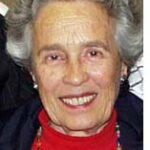By Eileen Wingard

LA JOLLA, California — Cheri Weiss, Cantorial Soloist at Congregation Beth El, organized a delightful evening, Cantor Caberet, featuring five cantors and Beth El’s twelve-voice choir, the Shirenu Chorus, which Weiss directs. Presented May 25 in the Garfield Auditorium at the Lawrence Family Jewish Community Center, the program included individual solos, the five cantors in ensemble, and the choir. The variety embraced liturgical and secular selections in Hebrew and English.
All five cantors had connections with the Academy of Jewish Religion, a transdenominational, Los Angeles-based seminary, established in 2001. Weiss is a fifth year cantorial student there, Lisa Peicott is in her fourth year, Cantor Jonathan L Friedmann serves as Professor of Jewish Music History, Cantor Sam Radwine is on its faculty and Cantor Joseph Gole, a past chairman of the West Coast Region of the Cantors Assembly, has served there in the past.
The singers were accompanied by two accomplished local pianists, Ruth Weber, Artistic Director of the San Diego Jewish Men’s Choir and Diane Benaroya, who is the publisher of L’Chaim Magazine.
The striking opening number began by blending the two women’s voices, then, the three male cantors walked on stage to join in Robert Solomon’s “Pitchu Li,” beautifully arranged by Josh Jacobson.
Other cantorial offerings were Lisa Petcott’s bell-like soprano in Eduard Birnbaum’s “Hashkivenu” and Sam Radwine and Cheri Weiss’ in Zina Goldrich’s “Sim Shalom.” Israeli songs were represented by Cheri Weiss’ spirited rendition of Naomi Shemer’s “Machar” and “Yerushalayim Shel Zahav,” and Jonathan Friedmann’s presentation of Max Helfman’s “Ki Mitzion.” The Debke rhythm was beautifully articulated by Friedmann’s resonant baritone.
With music’s ability to bring back memories, it reminded me of my wonderful session at the Brandeis Camp Institute in Simi Valley during the Summer of 1951, when Max Helfman was the the music director and inspired us campers with the songs of the young state of Israel.
Cantor Caberet had songs from Boadway, such as Sam Radwine’s excellent performance of “Bewitched” from Pal Joey, Lisa Peicott’s rousing, “I Could Have Danced All Night” from My Fair Lady and Cheri Weiss’ convincing “Nothing,” from A Chorus Line. Joseph Gole gave a dramatic interpretation of “Exodus” from the movie of the same name, with lyrics by Pat Boone and music by Ernest Gold.
That song, also, elicited many personal memories. I knew Ernest Gold when he served as the personnel manager of Peter Korn’s rehearsal orchestra in which I played. These two struggling German refugee musicians finally made their mark. Korn returned to Germany, and for 25 years, was the director of the Richard Strauss Conservatory in Munich and continued to compose. In fact, my younger sister, violinist Zina Schiff, performed the American debut of his violin concerto with the Baton Rouge Symphony. Ernest Gold worked in Hollywood and his big success was the movie score of Exodus. He was married to the brilliant soprano, Marni Nixon, who dubbed the singing voices of Debra Kerr in The King and I, Natalie Wood in Westside Story and Audrey Hepburn in My Fair Lady. In 2010, I visited Marni in NYC, an acquaintance since we both won PTA scholarships when we were 16 year-olds in Los Angeles.
One of Reform Judaism’s most prolific composers, Debbie Friedman, was represented by Shirenu’s interpretation of her “Kadish E’Rabana” and Cheri Weiss’ performance, with Hillel Katzeff on guitar, of “Traveler’s Prayer.”
Sam Radwine paid homage to a member of the audience, Cantor Sheldon Merel, Cantor Emeritus of Congregation Beth Israel, for his mentoring, teaching and friendship to many younger generations of cantors.
The final two numbers of the evening were “Hallelujah” by Leonard Cohen and “Hallelujah” by David Shukiar, a version which had a Gospel quality that served as a rousing climax.
This program reminded me that our Jewish liturgical music is greatly influenced by the music of our surroundings, even though, I, personally, look for that “pintele yiddishkeit” in the music, something that still relates to the Nusach, and the Tropes by which the Torah is read, something that still has a relationship to our Middle Eastern roots, or our Eastern European connections. I remind myself that it is the music with which I grew up, and that may be why it is dearest to me, but scripture admonishes us to Sing to the Lord a New Song.
The concert was a fundraiser for Cheri Weiss’ project, Hineni: Music for the High Holy Days. She has already distributed many copies to the elderly homebound and hopes to raise additional funds to increase the number of people who will benefit from being able to better observe the High Holidays with this recording.
*
Wingard, a retired violinist with the San Diego Symphony, is a freelance writer specializing in coverage of the arts. She may be contacted via eileen.wingard@sdjewishworld.com